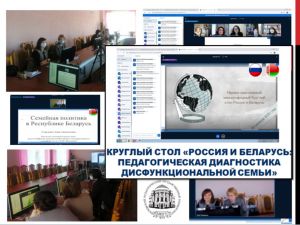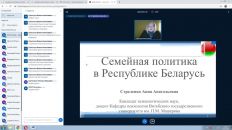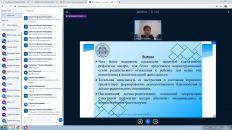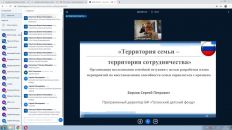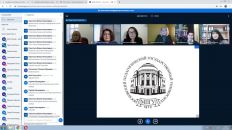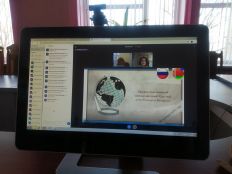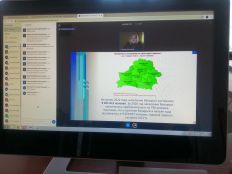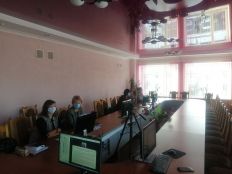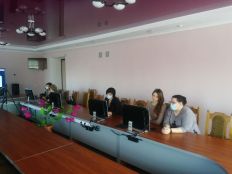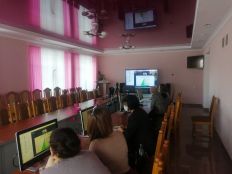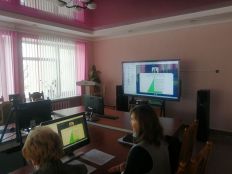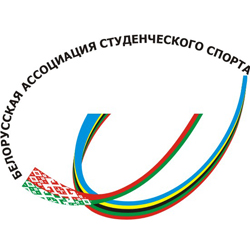ROUND-TABLE DISCUSSION “RUSSIA AND BELARUS: PEDAGOGICAL DIAGNOSTICS OF DYSFUNCTIONAL FAMILIES”
- Подробности
- Опубликовано 03.02.2021 08:48
MSPU teachers and Master’s degree students from the Department of Pedagogics and
Psychology, participated in the international research-to-practice round-table discussion “Russia and
Belarus: Pedagogical Diagnostics of Dysfunctional Families” on January 22, 2021. The discussion
was arranged by the representatives of the Department of Pedagogics and Psychology of the Family
Education, Institute of Pedagogics and Psychology, Moscow Pedagogical State University.
The following questions were discussed:
1. Basic characteristics of dysfunctional families.
2. Dysfunctional families: environment where social and problematic personality is created.
3. Potential of dysfunctional families.
4. Theory and practice of dysfunctional families.
Professor Elena Pristupa, Professor and Anna Shcherbiba, an Associate professor, from the
Department of Pedagogics and Psychology of the Family Education, Institute of Pedagogics and
Psychology, Moscow Pedagogical State University were acting in a position of the moderators of the
discussion.
Tatsiana Sakharova opened the ceremony and greeted all the participants of the conference
who joined the discussing from their home countries i.e. Russia, Belarus, Kazakhstan.
Olga Baydarova, PhD in Psychology, the Head of the Department of Сontinuous Education, paid
much attention to a great significance to this discussion to all the participants.
Anna Strelchenko, PhD in Psychology, Vitebsk State University, spoke about the family support
affairs held in the Republic of Belarus.
Elena Seto, Deputy Director for the Main Affairs at Vitebsk Regional Social and Pedagogical
Center, spoke about the position and the role of Social and Pedagogical Centers in the system of the
multi-agency cooperation established between the State bodies and other institutions upon the
matter of human rights, children safeguarding in the Republic of Belarus.
Irina Selezneva, Vitebsk Regional Institute of the Development of Education, spoke about the
psychological and pedagogical assistance of the families where the children with special needs are
brought up.
Svetlana Morozyuk, Doctor of Psychological Sciences, Professor, Institute of Pedagogics and
Psychology of Moscow Pedagogical State University, and Elena Kuznetsova, PhD in Psychology,
the leading specialist of the Department of Content Development of the Publishing House
“September the First”, singled out that the pathogenic self-analysis of a mother was treated as a
factor which was influencing negatively upon the relations between parents and kids.
Tatsiana Shaposhnikova, PhD in Pedagogics, Center of Social Support for Families and Kids,
talked about the practical experience of the family center.
Sergey Borzov, the Director of the Charity Fund “Tagan Orphan Home”, spoke about how the
specialists of the center worked with the families, how they investigated the problem and how they
made up individual activity plans.
The word “Family” means people who live together and run a joint household. There is an
emotional connection between these people in the family. However, if to speak about “a
dysfunctional family” there is still no definite explanation. When people want to describe the notion “a
dysfunctional family”, several synonymic word combination can be used instead: a disadvantaged
family, a destructive family, families who are at a high risk, inharmonious families.
All the families are different. All the families have problems and hardships, that’s why it is difficult
and the only correct answer to the question about how to assist a family, how to cooperate with the
institutions of social and pedagogical assistance. It is important to mention that intuition, mastery of a
specialist who will analyze the factors which influence on the family and then to make a decision of
how to help the family, parents and children, should be taken into consideration.







